Jul 21, 2025 – Leading Members’ Dharma Assembly
Hello. Today is the Leading Members’ Dharma Assembly, where Jungto Society’s leading members share the difficulties they face in their activities and establish a practice-oriented perspective.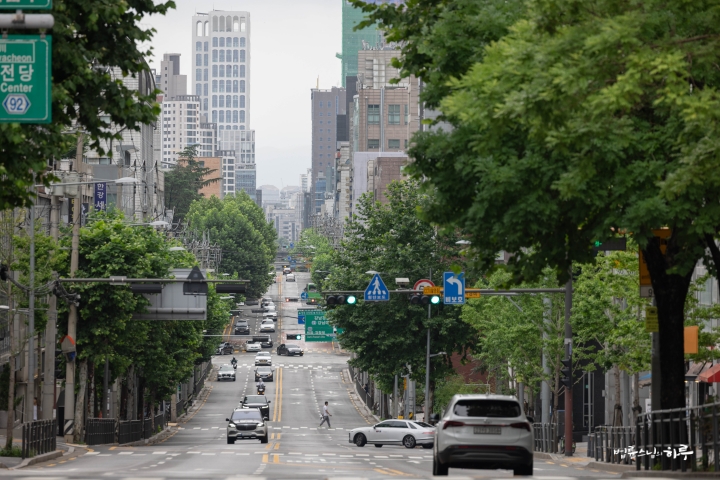
After completing morning practice and meditation, Sunim headed to the hospital at 6:30 AM for a regular health checkup. Since not all the health exam could be completed, he had to return to the Jungto Center for the Dharma assembly, deciding to finish the remaining tests in the afternoon.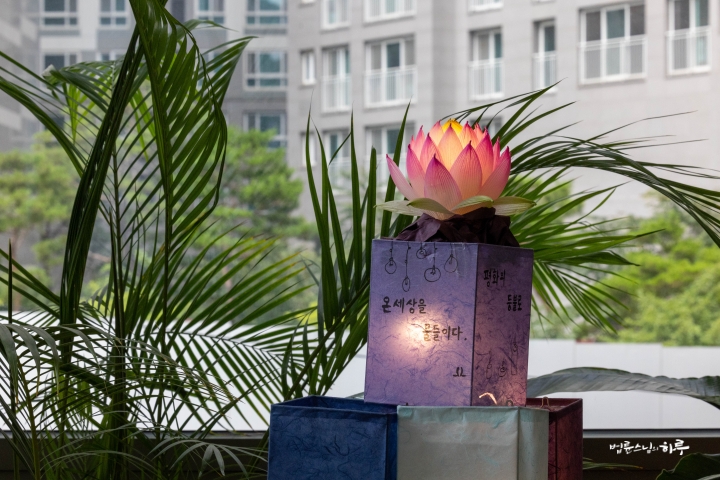
At 10 AM, the Leading Members’ Dharma Assembly was broadcast live from the Seoul Jungto Center broadcasting room. After the Three Refuges and Heart Sutra recitation, President Jeon Hae-jong of Jungto Society first announced the candidates for new Gyeolsa Practitioner training. Next, they welcomed the 38 new Seowon Practitioners who had just taken their vows yesterday.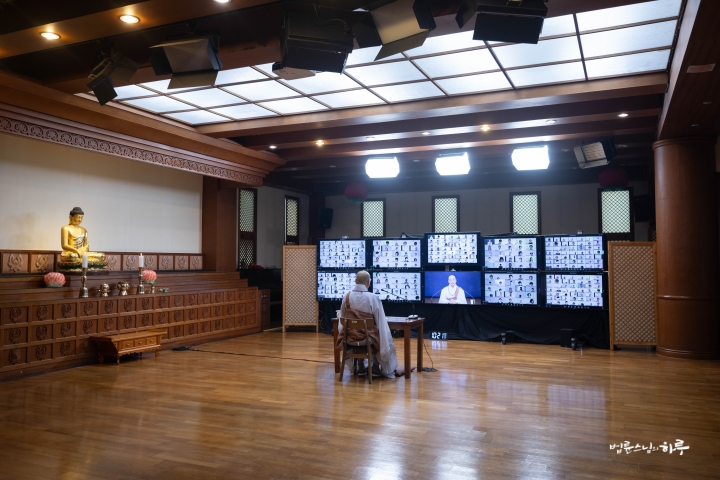
As each new Seowon Practitioner appeared on screen, everyone applauded warmly in congratulations. A representative spoke on behalf of all 38 new practitioners.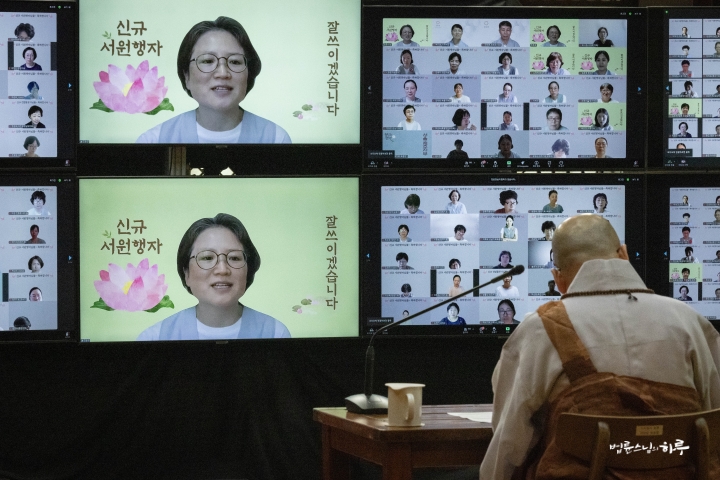
“I encountered Jungto Society when I faced difficult circumstances in my 30s. I came here longing to truly live, and I was overjoyed to discover the ‘religion of sharing’ I had dreamed of in my youth. However, at that time, I just felt a bit calmer and soon slipped back into my daily struggles. Wanting to give myself the greatest gift after living with only immediate concerns in sight, I enrolled in the Jungto Sutra Course, and it felt like I had finally returned to where I belonged after a long journey. While filling out the Seowon Practitioner application, I felt hesitant. I even wondered if someone as unworthy as me could follow this path. That’s when I realized I had fallen. I didn’t know I had fallen into foolishness, thinking I was special and that I shouldn’t fall since I had completed all the training. ‘I’ve fallen. Now I just need to get up.’ After that realization, I became more at ease with myself. I’m not walking this path because I’m perfect, not because I’m good at it. Even if I’m lacking and rough around the edges, I can still walk this path. I’m deeply grateful to the many Dharma Teachers who guided us during the training period, to the many fellow practitioners who generously encouraged us, and to my fellow practitioners who completed the course together until the end.”
With all leading members present in the video call, they requested a Dharma talk with three prostrations. Sunim began his talk by mentioning last week’s flood damage and discussing what attitude we should have in this era of climate crisis.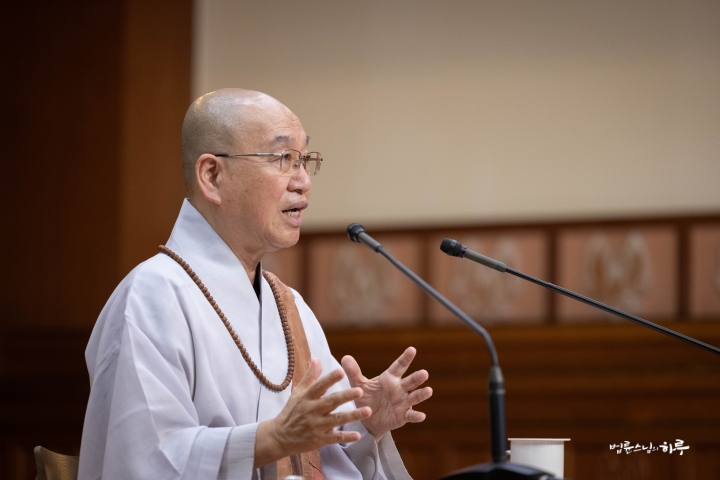
“Last week, concentrated heavy rains caused landslides, resulting in severe damage to crops, building flooding, and loss of life. I pray for the souls of those who perished and extend my deepest condolences to the bereaved families. I pray that recovery comes quickly for those affected, and JTS plans to provide support where needed.
Why We Must Change Our Standards for Living Well in the Climate Crisis Era
Last spring, unprecedented wildfires severely damaged forests, burned homes, and claimed lives. Now we’ve suffered great damage from torrential rains. While natural disasters occurred in the past, today’s heat waves and heavy rains occur much more frequently than before, with far more severe damage. This is the result of climate change due to global warming. It seems these natural disasters will continue to repeat every year. To fundamentally prevent the climate crisis, we need to find ways of living that reduce consumption, but it seems this crisis hasn’t yet become urgent enough to change our attitudes toward life.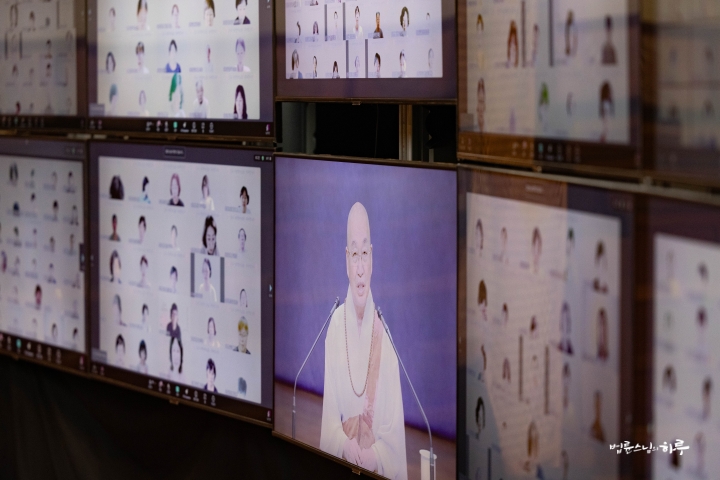
We still believe that consuming more means living better. Even in countries considered the most prosperous in the world, from the United States to our own Korea, the biggest concern remains economic issues, so consumption will inevitably continue to increase endlessly. However, increased consumption doesn’t free us from economic problems, and the side effects of endless consumption will continue to grow. In this regard, I believe Jungto Society members should live in a way that moves toward solutions, even if our efforts cannot solve these problems entirely.
When we didn’t know better, we thought consuming more meant living well, but now, experiencing this climate crisis, we must realize that one person’s excessive consumption is a major crime that brings disaster. We shouldn’t envy others’ excessive consumption, nor should we take pride in such a lifestyle ourselves. I hope we can have the proper life philosophy that living frugally even with money, helping those in need when we have extra, and living simply without feeling ashamed even if we have less money, is what it means to ‘live well.’
Next, Sunim mentioned today’s new Seowon Practitioners and Gyeolsa Practitioner training candidates, and explained in detail how Jungto Society’s membership system is structured.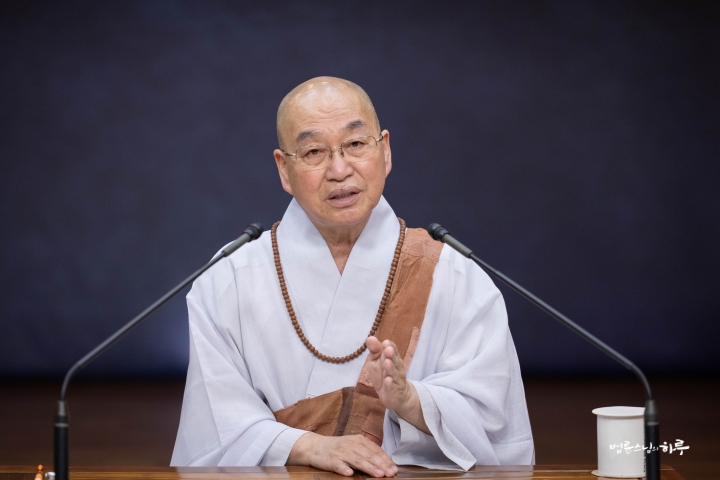
“Today we have welcomed thirty-eight new Seowon Practitioners, who can be called the core workers of Jungto Society. My sincere congratulations to you all. As we welcome these thirty-eight new Seowon Practitioners, I hope today becomes a time to once again understand Jungto Society’s membership structure.
The Path to Freedom from Suffering: That Is Practice
Jungto Society is a community of practitioners. We experience suffering when we cannot achieve what we desire. Most religions try to solve life’s problems by relying on a higher power to achieve what we want. However, not everything we want can be achieved. Also, we cannot fulfill everything others want from us – this is the reality of life. Therefore, if we try to achieve everything we want or try to do everything others expect of us, suffering will inevitably follow. It’s bound to be painful because it’s impossible. This kind of mistaken thinking leads to suffering. However, when we awaken to this foolishness, there’s no longer any reason to suffer. Recognizing one’s own foolishness and setting one’s mind to live a free and happy life is practice.
Jungto Society is a gathering of practitioners. Teaching what practice is constitutes the Buddha’s fundamental teachings, and showing how practitioners should live was demonstrated through the Buddha’s life. So when you study at Jungto Dharma School, you learn what practice is, and when you attend the Awakening Retreat, you actually experience that ‘when I awaken to my foolishness, suffering disappears and I become free!’ Of course, just learning about practice and getting a taste of it doesn’t mean it’s easy to apply in daily life. However, there’s a big difference between living your whole life without knowing at all and knowing but not being able to do it well.
That’s why to become a Jungto Society member, you must at least graduate from Jungto Dharma School. After graduating from Jungto Dharma School and submitting a membership application, you can participate in weekly Dharma assemblies and practice daily. Those who commit to Jungto Society’s vision and participate in living accordingly are Jungto Society members.
There are also people who agree with this purpose but don’t register as Jungto Society members and just sympathize with the cause. These are called supporting members. Though not affiliated with Jungto Society, they participate in Jungto activities and provide financial support.
Those Who Have Vowed to Walk the Buddha’s Path
When you become a Jungto Society member, you practice daily and participate in Dharma assemblies. Among Jungto Society members, those who find obligations burdensome and only practice, give offerings, or volunteer when they feel like it are called ‘general members.’ Those who take one step further from general membership and set their minds thinking ‘I want not only to practice myself but also to share this wonderful Dharma with others to help them’ are members who spread the Dharma, namely ‘leading members.’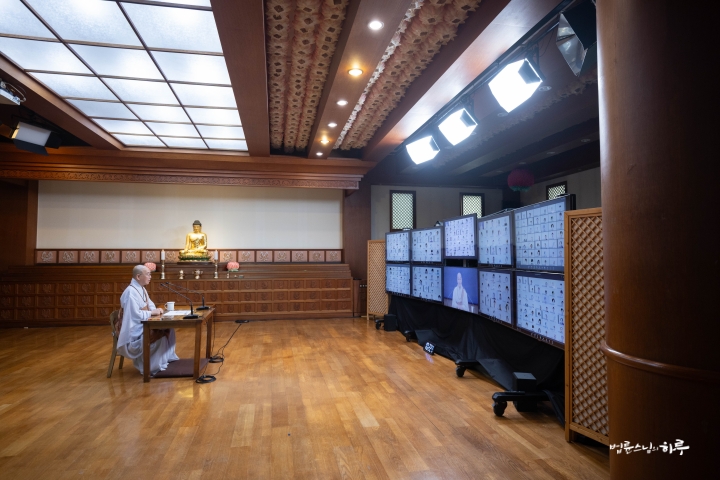
To become a leading member, practice must first become an obligation. It doesn’t make sense for someone who claims to spread the dharma to tell others to practice while not practicing themselves. Therefore, when someone becomes a leading member, they must engage in daily 1000-Day Practice dedication, participate in Weekly Dharma Assemblies and semi-annual retreats, and accept posal (confession ceremony), training, volunteer work, and donations as their responsibilities and obligations. Those who adopt this perspective are called leading members. Leading members are people who have made up their minds to ‘walk the path of the Buddha’ and ‘live like the Buddha.’ However, since we are still far from achieving the Buddha’s character, we call ourselves ‘mosaic Buddha’ because we aspire to emulate at least part of that character. Each of us has our own flaws, when we come together and work under the name of Jungto Society, our actions are equivalent to those of the Buddha.
There are three levels among leading members. The first level is ‘Balsim Practitioner (Junior Jungto Practitioner).’ Those who have made up their minds to become practitioners and walk the path of the Buddha are called Balsim Practitioners. When someone becomes a Balsim Practitioner, they receive the obligation to observe the five precepts. They also receive a Buddhist name, signifying that ‘if you continue to practice and dedicate yourself in this way, you will become a Buddha in the future.’ For Balsim Practitioners, practice, donations, and volunteer work are minimum obligations. These are not things you can do if you want to and skip if you don’t feel like it. 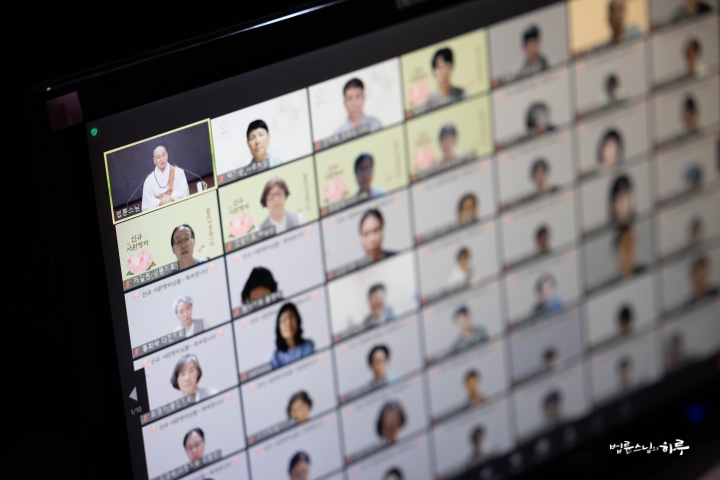
The second level is ‘Seowon Practitioner.’ When Balsim Practitioners continue their practice and establish a great vow saying, ‘I will build a Jungto world where the Buddha’s teachings spread and are realized in this land where I live,’ they are called Seowon Practitioners.
The third level is ‘Gyeolsa Practitioner.’ Seowon Practitioners participate in the 1000-Day Practice, and after one thousand days, they can choose whether to continue with another session or take a break. While the thousand days are mandatory, after fulfilling this obligation, they can stop if their mind changes or if it becomes difficult. They can also renew their commitment and continue for another thousand days. However, those who commit from the beginning to complete the full 10,000-Day Practice are called ‘Gyeolsa Practitioners.’ Those who commit to the 10,000-Day Practice don’t take breaks between stages. In Jungto Society, when members take on responsibilities such as team leader, group facilitator, branch manager, or division head, they take a brief rest period after completing a thousand days. When starting the next thousand days, new officers are elected and the practice begins anew. However, Gyeolsa Practitioners who have committed to the 10,000-Day Practice do not have such intermediate breaks. Today, five new candidates were recommended as Gyeolsa Practitioners. To become a Gyeolsa Practitioner, candidates must complete the Gyeolsa Practitioner training and receive unanimous approval from all existing Gyeolsa Practitioners. If even one person objects, the approval is not granted.
Today, there were two pieces of good news. Congratulations to those who were certified as Seowon Practitioners and those who were recommended as Gyeolsa Practitioners.” 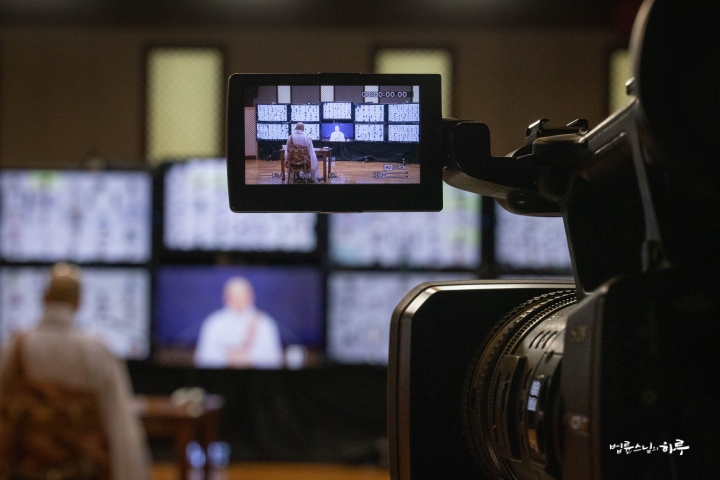
Next, Sunim received questions about difficulties encountered while engaging in activities. After one person pressed the hand-raising button and had a conversation with Sunim, the leading members’ Dharma assembly concluded.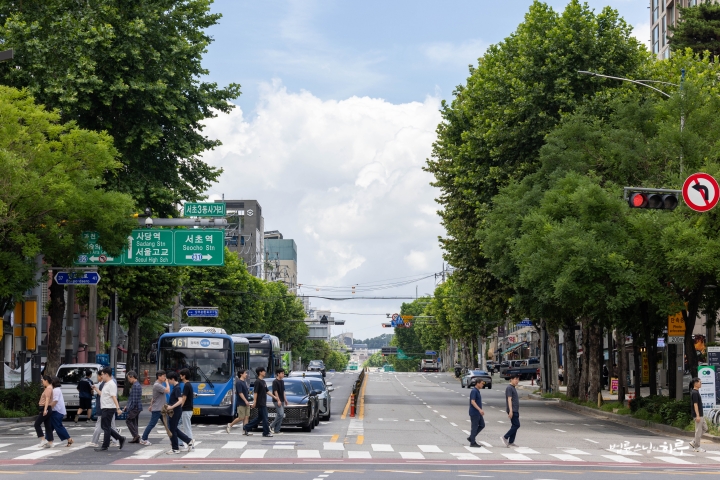
After the assembly, Sunim headed back to the hospital to complete the remaining health checkups. After finishing the examinations and stopping by the ophthalmology department for an eye exam, he returned to the Jungto Center. Today was spent entirely at the hospital.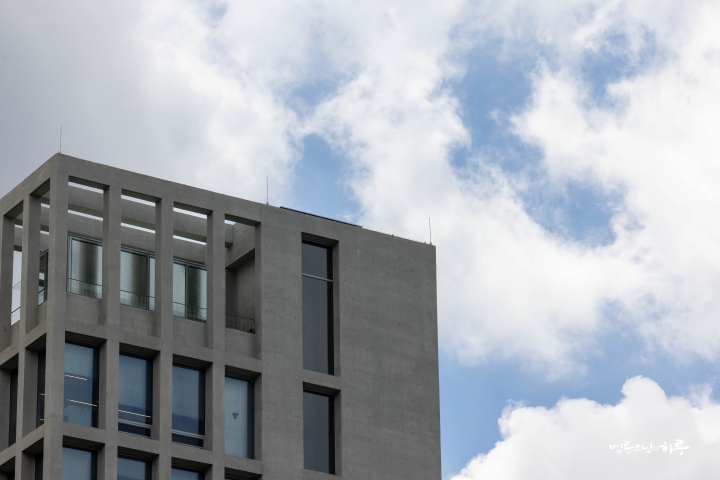
As the sun set, at 7:30 PM, the evening session of the leading members’ Dharma assembly began with members joining the video conference.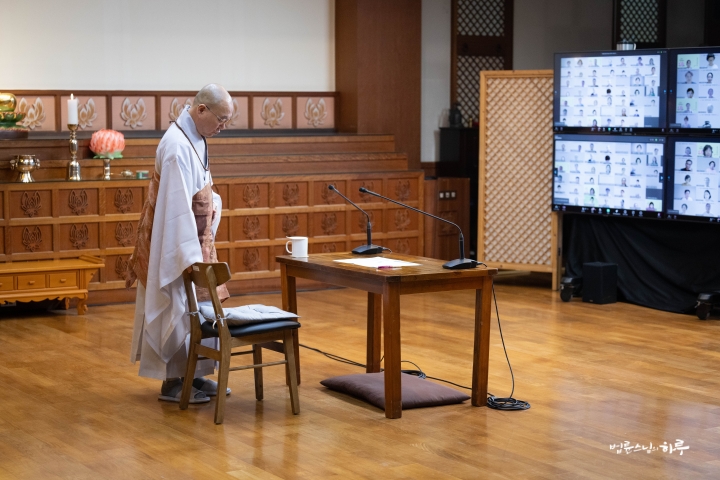
Like the morning assembly, announcements were made for new Gyeolsa Practitioner training candidates, and time was taken to welcome those who had become new Seowon Practitioners. After hearing impressions from one representative, everyone requested a Dharma talk from Sunim with three prostrations.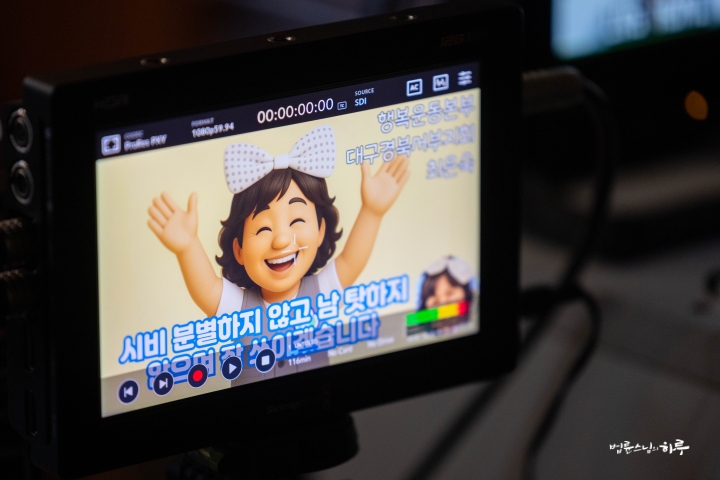
Sunim welcomed the new Seowon Practitioners and explained in detail about Jungto Society’s membership system, emphasizing that those who become leading members must also embrace the identity of being Tongil Euibyung (Korean Minutemen for Peace and Unification).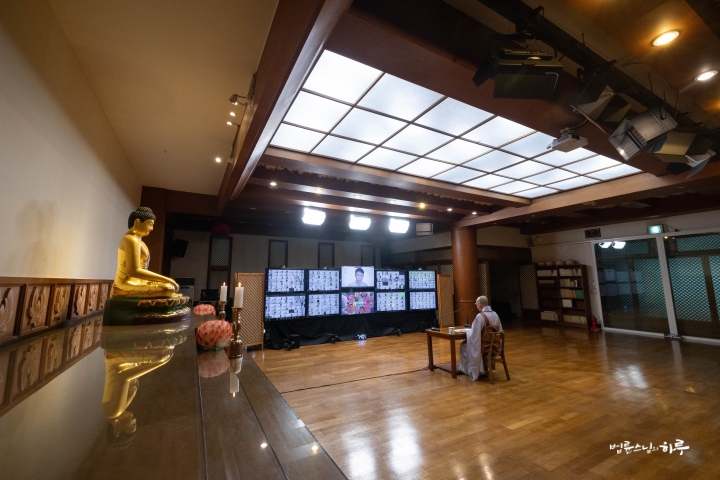
“Leading members, consisting of Balsim Practitioners, Seowon Practitioners, and Gyeolsa Practitioners, serve dual roles in Jungto Society as both leading members and Tongil Euibyung. In other words, those who have received Tongil Euibyung education and signed a pledge to become Tongil Euibyung are Balsim Practitioners of Jungto Society. General members only need to aspire to become practitioners. However, since its founding, Jungto Society has established two goals. As practitioners, we set the goal of spreading Buddha’s excellent Dharma widely, and as citizens of the Republic of Korea, we set the goal of becoming patriots who realize the national objectives specified in the Constitution. The preamble of the Constitution states our national objectives as follows:
‘We, the people of Korea, proud of a resplendent history and traditions dating from time immemorial, upholding the cause of the Provisional Republic of Korea Government born of the March First Independence Movement, and committed to the peaceful unification of our homeland, having determined to consolidate national unity with justice, humanitarianism and brotherly love by revitalizing the democratic ideals of the April Nineteenth Uprising against injustice, and to destroy all social vices and injustice.’ 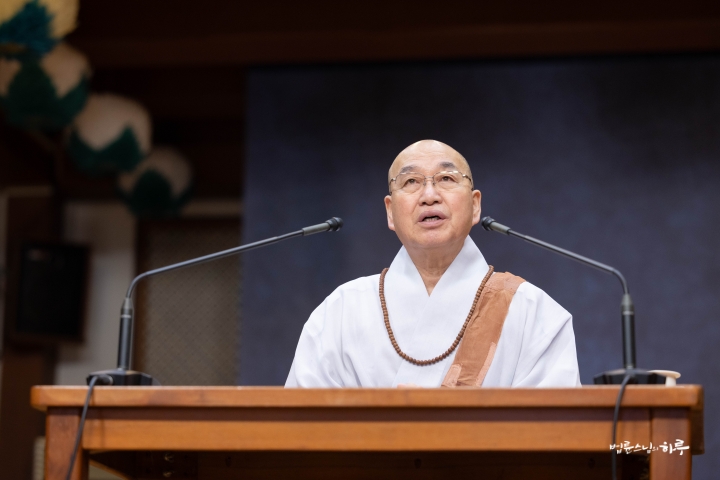
We must build a democratic nation where the people are sovereign. Monarchy or dictatorship does not align with the national identity of the Republic of Korea. Under no circumstances should we think of solving problems through war. This does not align with our national identity. We must solve problems peacefully. While it may be difficult now, we must not lose the dream of moving toward a unified nation someday. Contributing to these national tasks as citizens of the Republic of Korea is the founding spirit of Jungto Society.
The Path of a Practitioner and the Mission as Tongil Euibyung
Therefore, to become a Balsim Practitioner, one must not only receive the Five Precepts and commit to steadily practicing according to Buddha’s Dharma but also understand and commit to becoming Tongil Euibyung to realize the national tasks of the Republic of Korea.
However, recently observing the words and actions of our leading members, it seems many are not aware that they are Tongil Euibyung. While there is some awareness of being practitioners through participation in Posal ceremonies, there seems to be little recognition of being Tongil Euibyung. So I would like to take this opportunity to remind all leading members once again that you are Tongil Euibyung. 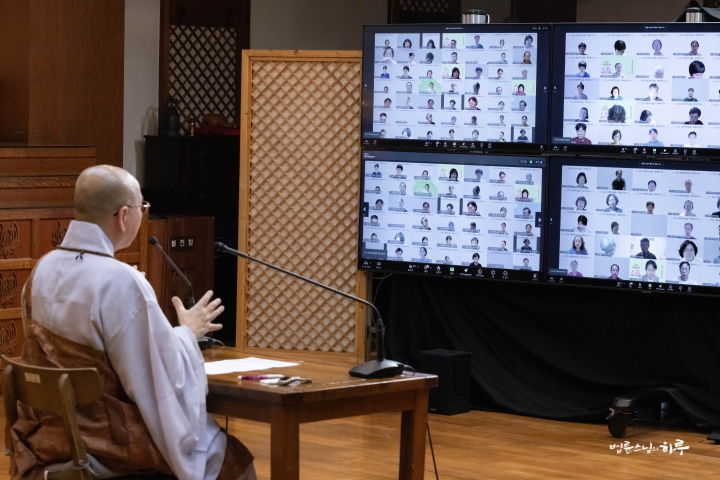
The Korean Minutemen for Peace and Unification (KMPU) must be ready to stand up for peace when there is a risk of war. If martial law had not been lifted this time and military rule had begun, when the Special Committee on Unification called for action to ‘defend democracy,’ KMPU members would have been obligated to participate. If there is a risk of war, they must also participate obligatorily to protect peace. Of course, Jungto Society is not a political organization. It does not support any specific political party. However, to realize the goals of peaceful unification and democracy, if a political party shares our aspirations, we can support that party’s policies. This is not supporting the party itself but supporting its policies. Since Jungto Society is a practice organization, it does not engage in political activities. However, because achieving peaceful unification is Jungto Society’s goal, we established the Peace Foundation and are active through it.
Why Should the Korean Minutemen for Peace and Unification Take the Lead in Protecting Peace and Democracy?
The Korean Minutemen for Peace and Unification should pursue peace not only in inter-Korean relations but also domestically between progressives and conservatives, and between the ruling and opposition parties, working together to maintain peace. To improve inter-Korean relations, national unity must also be achieved. To move toward peace and unification, we cannot solve problems according to the claims of any specific political force alone. This is because when the government changes, things return to their original state. That’s why we must place great importance on national unity.” 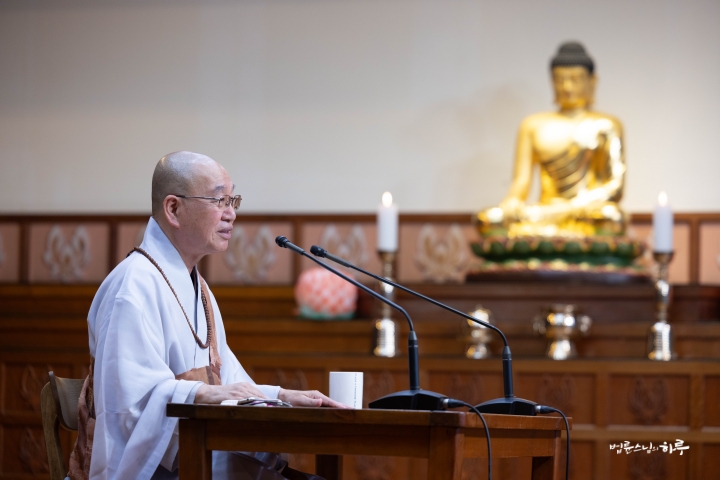
Following this, questions were taken about any concerns. For one hour, three people who had pre-registered their questions had conversations with Sunim. The last questioner asked for Sunim’s advice on how to view the various allegations pouring out during recent confirmation hearings for ministerial candidates.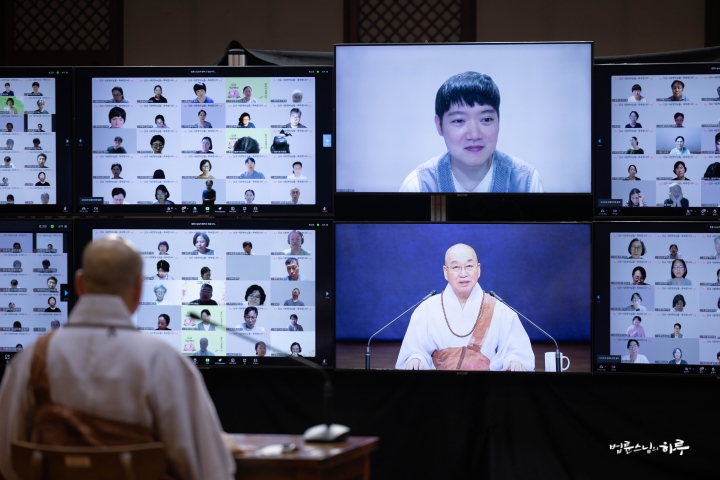
How Should We View Confirmation Hearings Filled with Allegations?
“First, I think it would be good if any government, when selecting people, would not only recommend their own people but broadly seek recommendations for people suitable for the job. However, in the real world, people tend to prioritize recommending those they know well or are close to, which leads to these problems. 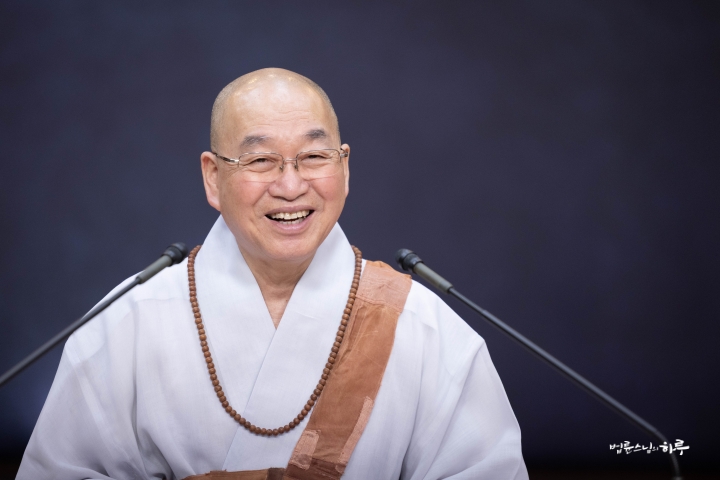
Second, in our society, ordinary people have been moving here and there trying to make money through real estate, falsely registering addresses to change school districts, illegally sending children abroad for early education if they have some status or money, and plagiarizing papers – living in unjust ways. The reason these things happen regardless of progressive or conservative affiliation is that in the process of our society’s rapid development, the majority have relied on solving problems through personal connections rather than following laws and rules. As a result, when anyone’s background is examined, few people are found to be clean.
Third, for ministerial confirmation hearings, we should examine whether the person can perform the duties well. However, these days, hearings tend to focus on very personal and trivial matters like parking violations. Of course, it would be nice if ministerial candidates were clean even in small matters, but I think we need to overlook issues unrelated to their work. The perspective on confirmation hearings should change to ask, ‘Does this person have any disqualifying factors for doing this job?’ While criminal matters should certainly be examined, the problem is that when even small matters unrelated to the person’s duties are scrutinized too thoroughly, no one is without issues. 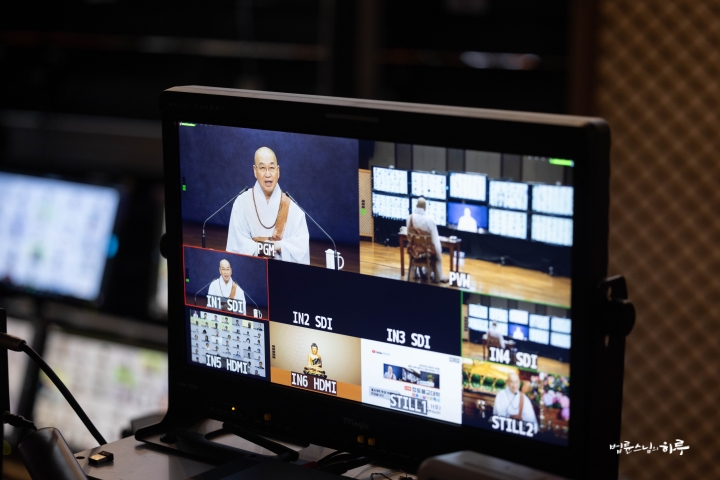
I think you feel confused watching the confirmation hearings because various issues are intertwined. Sometimes political battles occur that don’t align with the purpose of the hearings, and we’re seeing how people considered smart in our society have been pursuing personal gain through their talents, such as real estate speculation. I think these problems occur more frequently because appointments are made too centered around close associates, essentially as rewards for loyalty. 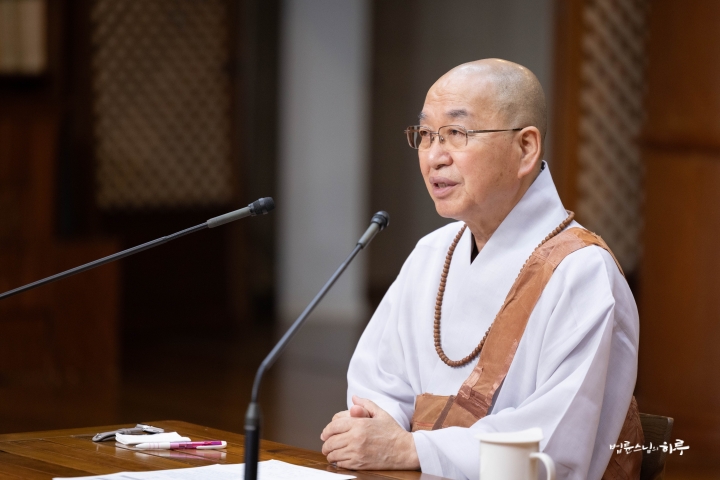
Still, don’t be too disappointed. If personnel appointments are handled more fairly at times like this, they will receive public support. If appointments are made carelessly, relying only on supporters, they will eventually face public judgment. The previous administration also pushed through controversial appointments despite opposition from the National Assembly. While such actions may not seem to have much impact initially, they will definitely have consequences over time. Although the current administration has high approval ratings now, if issues that go against public sentiment accumulate one by one, they could become major problems. It would be good if they could accommodate public opinion well, but politics cannot be as ideal as ordinary citizens think. I hope you’ll take these broader circumstances into account as you reflect on it.”
“Yes, I understand.”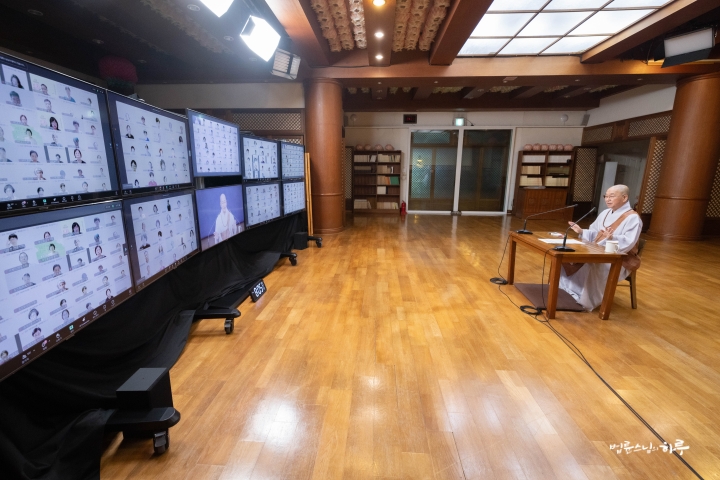
Questions continued one after another. By the time the dialogue ended, it was well past 9 PM. The live broadcast concluded with a promise to meet again at next month’s leading members’ Dharma assembly.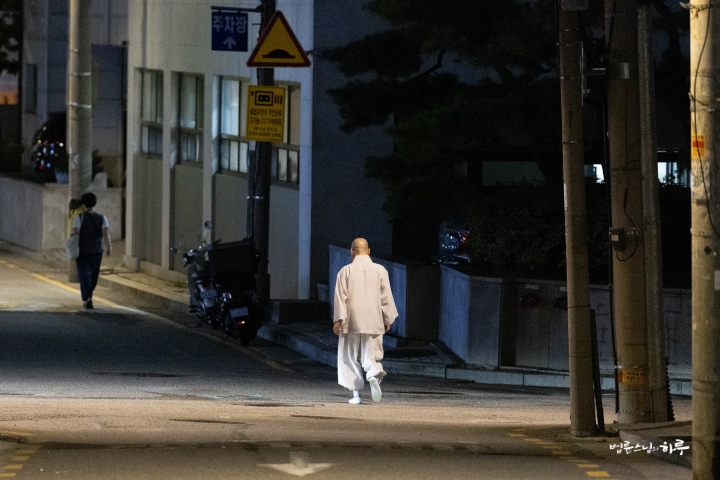
Sunim immediately headed to the Peace Foundation. Late at night, a public figure came to visit Sunim for a conversation. After discussing South Korea’s foreign policy extensively, including how to manage inter-Korean relations, North Korea-US relations, and North Korea-Japan relations to maintain peace on the Korean Peninsula, Sunim saw off the guest after 10 PM and concluded the day’s activities.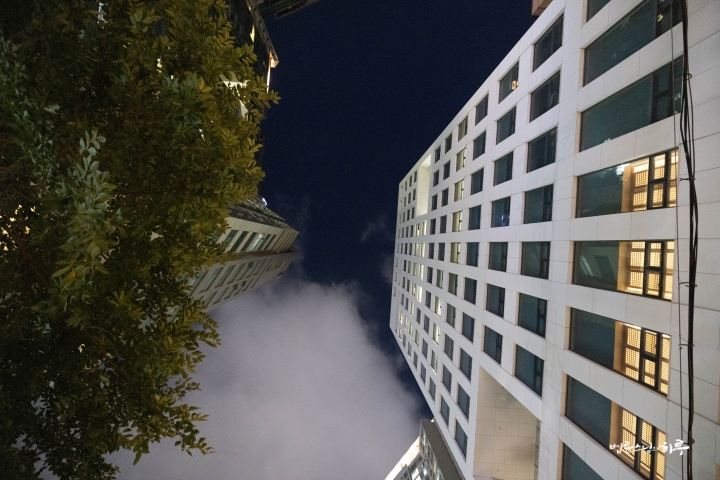
Tomorrow, Sunim will meet with foreign affairs and security experts in the morning, then travel to Daejeon in the afternoon to give a Dharma Q&A lecture for military officers working at Gyeryongdae, where the headquarters of South Korea’s three military branches are located. In the evening, he will hold a Happy Dialogue Dharma Q&A lecture at the KAIST auditorium in Daejeon.





